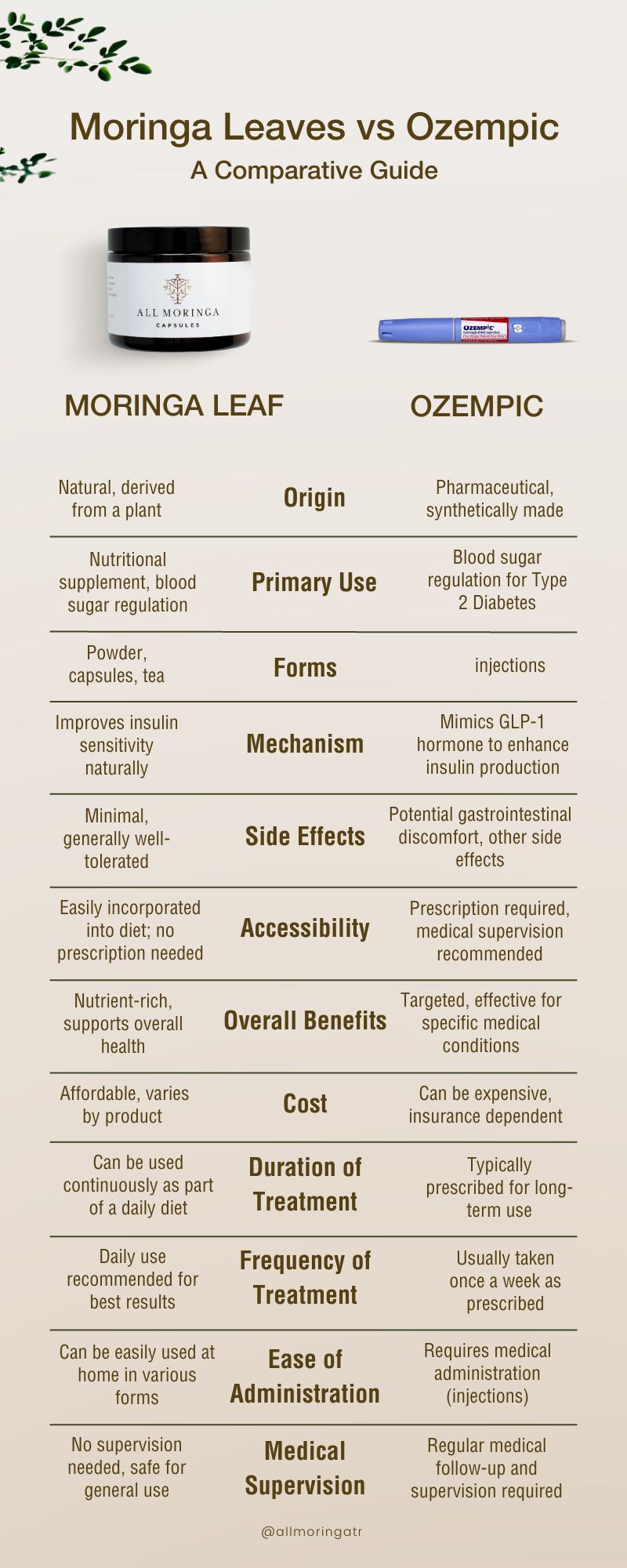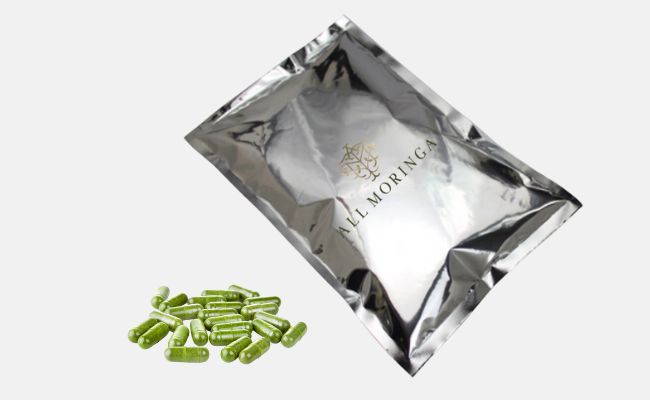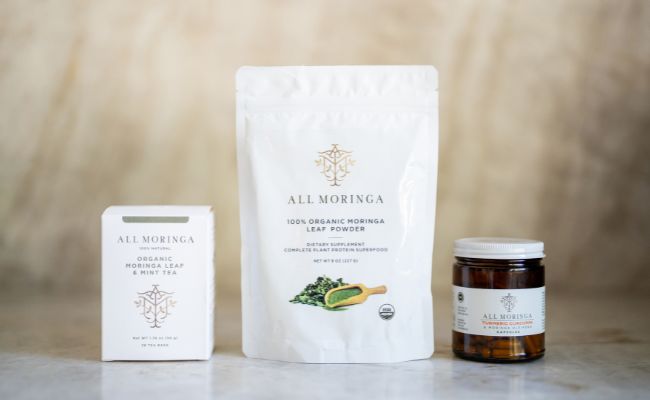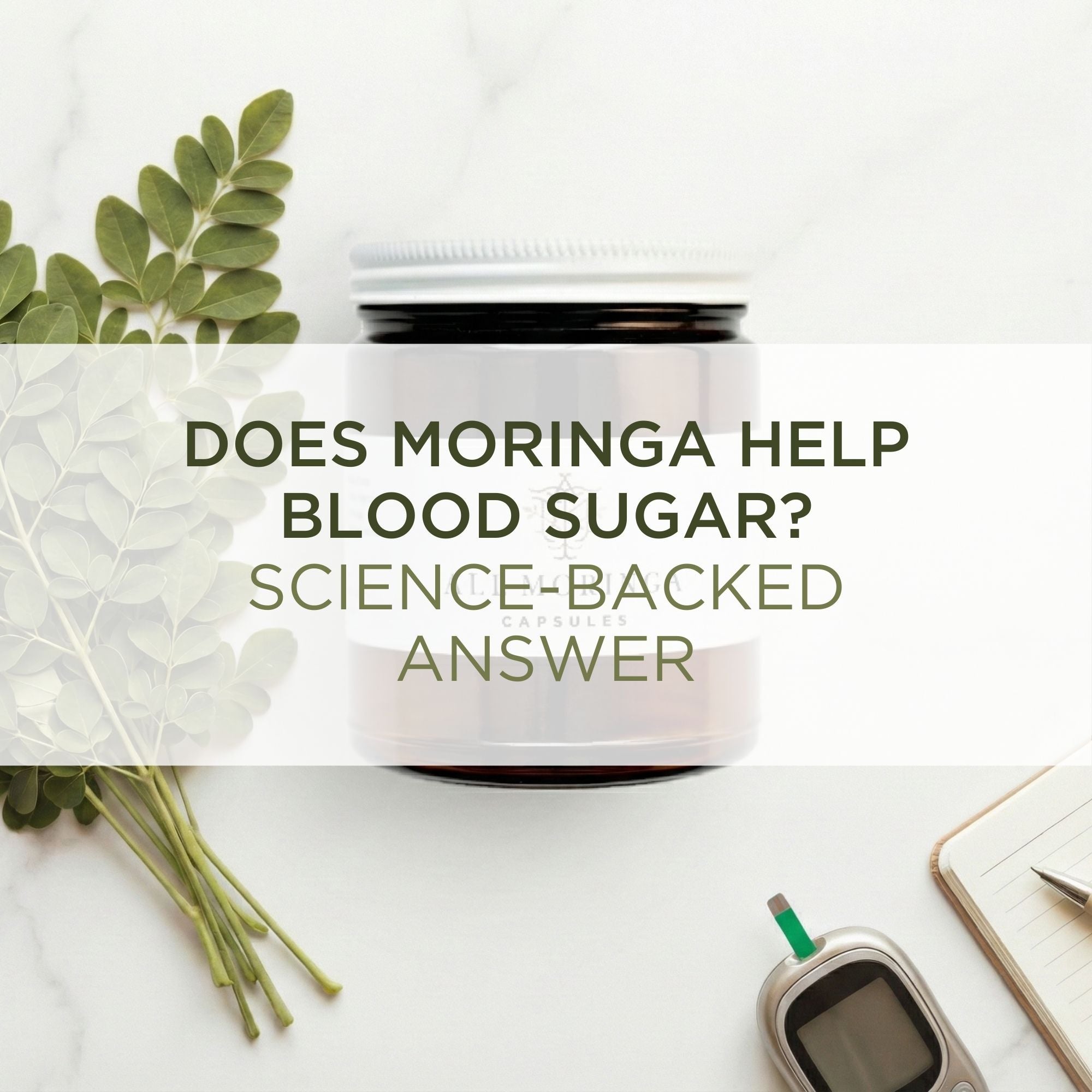Moringa vs. Ozempic: A Natural Path to Blood Sugar Management and Wellness (Infographic)

In a world where health and wellness are paramount, the choices we make in managing our well-being have never been more critical. Recently, The Mirror shone a spotlight on a natural alternative that is gaining momentum in the health community - Moringa leaves, praised for their ability to regulate blood sugar naturally. This comprehensive guide delves into the comparison between Moringa, a gift from nature, and Ozempic, a product of pharmaceutical advancements, in managing blood sugar levels.
The Rising Star of Natural Health: Moringa Leaves for Anti-Diabetes Benefits
Nature offers us a bounty of health-enhancing gifts, one of which is the remarkable Moringa Oleifera. Known as the 'Miracle Tree', Moringa leaves are not just another health supplement; they are a powerhouse of nutrition. Rich in vitamins, minerals, and antioxidants, these leaves have been used for centuries in traditional medicine to address a myriad of health concerns.
But what sets Moringa apart in today's health landscape is its effectiveness in blood sugar management. Studies have shown that Moringa leaves contain compounds that help improve insulin sensitivity, thereby naturally regulating blood sugar levels. This is particularly beneficial for those looking to manage their health through diet and lifestyle changes, as Moringa can be easily incorporated into daily meals, smoothies, or taken as a supplement.
Moringa leaves are naturally grown and processed. Just like eating fresh vegetables, your body recognizes and absorbs their nutrients for maximum benefits.
The study "Isothiocyanate-rich Moringa oleifera extract reduces weight gain, insulin resistance, and hepatic gluconeogenesis in mice" explores the therapeutic potential of Moringa oleifera in managing obesity and type 2 diabetes. Key findings include:
-
Mice fed with a high-fat diet supplemented with Moringa concentrate showed less weight gain, improved glucose tolerance, and better insulin signaling compared to control mice. They also didn't develop fatty liver disease.
-
The study suggests that the bioactive compounds in Moringa, specifically moringa isothiocyanates (MICs), are primarily responsible for these effects. These compounds are shown to inhibit liver gluconeogenesis, leading to increased insulin sensitivity.
-
The results indicate that Moringa oleifera could be an effective dietary component for preventing and treating obesity and type 2 diabetes, due to its impact on weight management, insulin resistance, and inflammation.
Other study Therapeutic Potential of Moringa oleifera Leaves in Chronic Hyperglycemia and Dyslipidemia: A Review
-
Scientific evidence: The article summarizes multiple scientific studies showing the anti-diabetic and lipid-lowering effects of moringa leaves in both animal models and human trials. This provides credibility to health claims about moringa.
-
Bioactive compounds: It details the key bioactive compounds in moringa leaves like quercetin, chlorogenic acid, and moringinine that are responsible for its health benefits. You could highlight these compounds in your marketing.
-
Mechanisms of action: The review explains how moringa leaves work to lower blood sugar and improve lipid profiles through various mechanisms. This demonstrates the multi-faceted benefits of moringa.
-
Safety: The article discusses toxicology studies showing that moringa leaf consumption is generally safe at typical doses. This can help address safety concerns.
-
Comparison to medications: Some studies showed moringa's effects were comparable to anti-diabetic and cholesterol-lowering drugs. This positions moringa as a natural alternative.
-
Multiple benefits: Beyond diabetes and cholesterol, the article mentions moringa's antioxidant, anti-inflammatory and hepatoprotective properties. This highlights its versatility.
-
Need for standardization: The review calls for standardization in cultivation and processing to ensure consistent quality. You could emphasize your quality control measures.
-
Future research: It identifies areas needing further study, showing moringa is an active area of scientific interest.
-
Global relevance: The article notes moringa's potential in addressing metabolic disorders in developing countries where it's commonly grown
Those researches provide a scientific basis for using Moringa oleifera in dietary interventions for these conditions, emphasizing its potential health benefits.
other diabetic-related research key points:
1. From Evaluation of Antidiabetic and Antioxidant Activity of Moringa oleifera:
"
Moringa oleifera leaf extract significantly lowered blood glucose levels in diabetic rats. This effect was comparable to insulin, demonstrating the plant's potent hypoglycemic properties due to its rich antioxidant profile."
2. From "Effect of Ethanolic Leaves Extract of Moringa oleifera on Blood Glucose Levels of Streptozocin-Induced Diabetics":
3. From Nutraceutical or Pharmacological Potential of Moringa oleifera Lam:
Furthermore, Moringa's benefits extend far beyond blood sugar regulation. Its high nutrient content supports overall well-being, from boosting energy levels and immune function to reducing inflammation. These leaves are a testament to the power of natural solutions in maintaining health and preventing disease.
Ozempic - Understanding the Pharmaceutical Route
Ozempic, known generically as Semifluid, represents a modern pharmaceutical approach to managing blood sugar levels, particularly for individuals with Type 2 Diabetes. It functions by mimicking the GLP-1 hormone, which is crucial for insulin production, thereby directly influencing blood sugar control. This targeted action can lead to significant improvements in glycemic control for those who require immediate intervention.
However, the pharmaceutical route often comes with considerations of side effects and long-term impacts on health. Users of Ozempic may experience gastrointestinal discomfort and other side effects, necessitating a discussion with healthcare providers to understand its suitability for individual health conditions.
A Comparative Analysis - Moringa and Ozempic in Action:
When comparing Moringa leaves and Ozempic, the contrast is evident in their approach to managing blood sugar. Moringa offers a gradual, holistic improvement in metabolic health, enhancing the body's natural insulin sensitivity without significant side effects. On the other hand, Ozempic provides a more immediate response but requires careful medical management and consideration of potential side effects.
Moringa Leaves:
-
Rich Nutritional Profile: Moringa leaves are abundant in vitamins (Vitamin A (Beta-Carotene), Vitamin C (Ascorbic Acid), Vitamin E (Tocopherol), Vitamin K, Vitamin B1 (Thiamine), Vitamin B2 (Riboflavin), Vitamin B3 (Niacin), Vitamin B6 (Pyridoxine), Folate (Folic Acid)), minerals (Calcium, Potassium, Iron, Magnesium, Phosphorus, Zinc, Copper, Manganese, Selenium), and all essential amino acids.
-
Blood Sugar Management: They contain compounds like isothiocyanates which enhance insulin sensitivity, helping in the natural regulation of blood sugar levels.
-
Antioxidant Properties: Moringa leaves are high in antioxidants (Quercetin, Chlorogenic Acid, Beta-Sitosterol, Caffeoylquinic Acid, Kaempferol) which combat oxidative stress and may improve overall metabolic health.
-
Holistic Health Benefits: Regular consumption can lead to improved energy levels, enhanced immune function, and reduced inflammation.
Ozempic:
-
Immediate Effectiveness: Ozempic, as a GLP-1 agonist, quickly reduces blood sugar levels by enhancing insulin production.
-
Medical Supervision: Requires prescription and ongoing medical supervision due to potential side effects and specific dosage requirements. Nobody really knows the affect on your health with long term use
-
Long-term Commitment: Typically prescribed for chronic use in Type 2 Diabetes management. It's important to note that stopping Ozempic abruptly can lead to rebound high blood sugar levels and weight gain. The long-term health impacts of Ozempic are not fully understood. It's crucial to consult healthcare professionals regarding its prolonged use.
Moringa Leaves vs Ozempic A Comparative Guide (Infographics)

Testimonials and Success Stories:
Real-life experiences often speak volumes about the effectiveness of health products. Numerous users of Moringa have reported improved energy levels, better blood sugar control, and an overall enhancement in their quality of life.
testimonials from your customers who have benefited from Moringa products.



The journey towards optimal health is deeply personal and varies from one individual to another. Whether it is through the natural path with Moringa or the medical precision of Ozempic, the ultimate goal remains constant - better health and wellness. We encourage you to explore, research, and most importantly, consult with health professionals to make the best decision for your health journey.
Discover the natural benefits of Moringa with our range of products, designed to complement your journey towards a healthier life. Visit our website to learn more and embrace the path to wellness with nature's own solution.
If you’re curious about how Moringa compares to another natural compound, Berberine, in managing blood sugar levels, check out our post on Moringa and Berberine: A Natural Duo for Blood Sugar Management
To learn more about the benefits of Moringa leaves click here
References:
https://www.mdpi.com/1420-3049/26/12/3513
Antidiabetic properties of Moringa oleifera
https://academicjournals.org/journal/JDE/article-full-text/FF8279F63501
Moringa oleifera leaf supplementation as a glycemic control strategy in subjects with prediabetes
https://pubmed.ncbi.nlm.nih.gov/35010932/
Effects of Moringa oleifera on Glycaemia and Insulin Levels: A Review of Animal and Human Studies
https://pubmed.ncbi.nlm.nih.gov/31810205/
Evaluation of antidiabetic and antioxidant activity of Moringa oleifera in experimental diabetes
https://onlinelibrary.wiley.com/doi/full/10.1111/j.1753-0407.2011.00173.x
FDA Disclaimer
*This statement has not been evaluated by the Food and Drug Administration. This product is not intended to diagnose, treat, cure, or prevent any disease.









Leave a comment
This site is protected by hCaptcha and the hCaptcha Privacy Policy and Terms of Service apply.